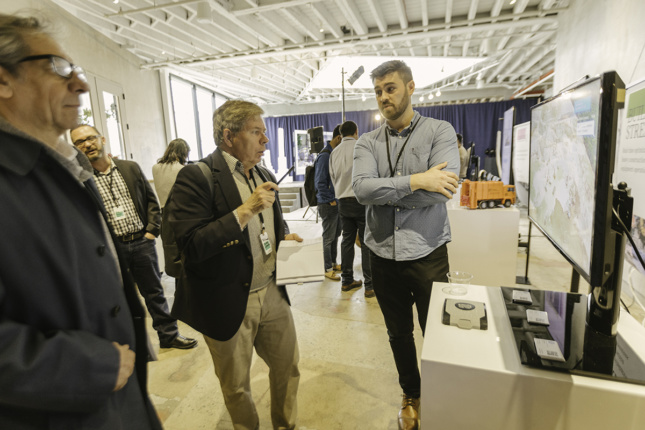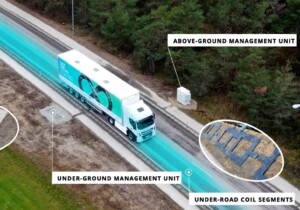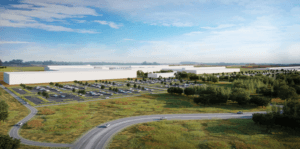Yesterday at A/D/O, a MINI-sponsored creative space in Brooklyn, New York, seven start-ups pitched their companies to an audience of investors and public sector agencies as part of URBAN-X’s Demo Day. URBAN-X is an accelerator for urban tech companies that was launched in 2016 by BMW-owned car brand MINI, one of its many forays into rethinking shelter, fashion, and design. The seven start-ups are members of URBAN-X’s fifth cohort, bringing the total number of companies that URBAN-X has fostered to 39. URBAN-X selects up to 10 start-ups twice a year for its program, which includes a $150,000 investment and five months of support in engineering, design, and business development.
Urban mobility and access to electric vehicles featured prominently in this cohort, not a surprising theme for an incubator with roots in the automotive sector. But other strong trends, like construction site productivity and emissions efficiency, pointed to a focus on the built environment and its relationship with ecological concerns.
If this cohort is any indication of the trends in urban mobility, then the two startups dedicated to transit hinted at a very electric future. Borrow offers short-term, flexible leasing of electric vehicles, making them more available to those who can’t purchase the pricey cars, while Circuit, formerly The Free Ride, offers free electric shuttle transportation in five-passenger vehicles for short distances. The latter is already rolled out in 17 cities around the United States, with more than 20 cars on the streets of San Diego. With funding from advertisers, private developers, and transit agencies, the free shuttle is specially designed for first- and last-mile conditions to supplement other forms of transit, and also offers hail and on-demand services. Brooklyn residents and visitors can experience Circuit for themselves, with the company extending its Williamsburg run this summer.

Buildstream and Toggle both address construction site safety and other challenges. Buildstream (formerly GearBuddy) utilizes IoT-based software and machine learning to digitize data collection on heavy construction equipment like bulldozers and trucks to monitor and assess construction sites in real time, allowing someone at an office desk and not just the construction manager on site to monitor what is happening. The technology is currently in use in the U.K. on one of Europe’s largest infrastructure projects, according to David Polanski, co-founder and COO of the company. Toggle, on the other hand, combines software and industrial robotics to help automate the construction site and reduce costs in the building process.
Energy efficiency and greenhouse gas emissions are also a central concern of this year’s cohort. Treau develops technology to improve energy efficiency in cooling and heating systems, essentially bringing HVAC and refrigerants into the modern age with lighter, more inexpensive polymers and other material innovations. The overarching promise of Treau is to reduce energy consumption in the U.S. by 10 percent.
Another vital but less glamorous aspect of city life is waste management infrastructure. Israel-based GreenQ‘s technology attaches to existing truck-based garbage collection systems to collect data and offer analytics to help meet demand and cut costs where needed. For example, in its applications across Israel cities, towns, and villages, GreenQ has identified areas that need one less collection day a week, or data on what homes or users need larger trash receptacles. The data from the garbage also delivers demographic data for those companies it partners with. Consumption and waste were also addressed by Thrilling, the first e-commerce platform for second-hand and vintage stores, with a goal of reducing carbon, waste, and water footprints in garment production.
From transit to garbage, the technology-driven platforms of these start-ups hints an increasingly wired, mobile urban future to come.











